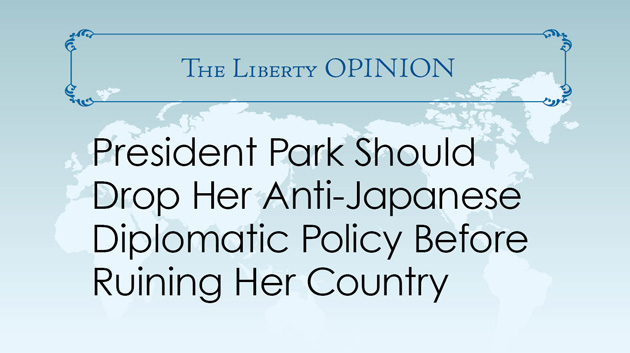President Park Should Drop Her Anti-Japanese Diplomatic Policy Before Ruining Her Country
One of the Major Newspapers in South Korea Gives Candid Advice
The Chosun Ilbo, the largest-circulation daily in South Korea, raised questions about the nation’s anti-Japanese diplomatic policy in its column titled “Are Koreans Too Intractable?”
The column was written by an op-ed columnist of the paper. At the start of the article, he writes that it looks like Korea and China are the only countries in the world that remain opposed to Japan’s exercise of the right to collective self-defense, pointing out that Korea’s hard-line attitude toward Japan has made the nation isolated internationally. South Korea is opposed to the Japan’s move to approve the use of the right to collective self-defense, while Russia, which was Japan’s enemy in World War 2, as well as the Philippines and other Southeast Asian countries, is welcoming the move.
The columnist also notes that Japan has gained a higher international reputation than Korea and that Korea’s irrational behavior has turned out to undermine its international trust. One major example is several Korean court rulings ordering Japanese companies such as Nippon Steel & Sumitomo Metal Corp. and Mitsubishi Heavy Industries Ltd. to pay compensation for what they claim were forced labor during wartime. The criticism of the compensation issue in the column is precise and to the point.
The following is the excerpt from the column.
“On June 22, 1965, Korea and Japan signed a treaty confirming that all obligations to compensate Korean victims for colonial and wartime atrocities were settled with a lump payment. Korea signed another contract forfeiting any right to make any further claims for atrocities and then used the US$300 million to build steelmaker POSCO, the Gyeongbu Expressway linking Seoul and Busan, and power generation plants, which enabled it to achieve an economic miracle in record time.
However, lately several courts here have ruled that Japanese businesses must compensate Koreans who were forced to work for them during World War II. This type of ruling is unheard-of in four other Asian countries that signed similar treaties with Japan. […] it could still be seen as prone to reneging on international treaties whenever it sees fit.”
In Korea, there has been more and more criticism against the anti-Japanese policy of the government. Especially, there is growing concern about President Park’s hard-line attitude toward Japan.
President Park has been refusing to have a summit with her Japanese counterpart by bringing up the comfort women issue. Japanese Prime Minister Shinzo Abe has stated that the door to a dialogue is always open, but President Park told the BBC interview that unless the issues of history and comfort women were resolved, it would be better not to have a summit. This show that Park has no intention of holding talks with the Japanese leader in the future.
Chosun Ilbo and Joong-an Ilbo criticize Park’s hard-line attitude in articles stated respectively “Korea needs to leave the victim mentality behind” and “President Park should talk with the country that she dislikes,” questioning Park’s diplomatic policy to rebuff Japan’s offer to hold a summit.
The two newspapers harsh criticism of their own country reflects the fact that Korea has had to admit that keeping a strong attitude toward Japan is not only ineffective but also undermines its international reputation.
The column of Chosun Ilbo still calls Japan a country that committed war crimes and claims that Korea is the biggest victim of imperial Japan’s atrocities. On the other hand, however, Korea seems to be realizing that talking and acting emotionally alone cannot make the international community listen to what Korea has to say.
Amidst the possible outburst of a military move by North Korea, and the growing threat of Chinese hegemony in Asia, Korea’s choice to deepen the political confrontation with its neighbor could ruin the country. Korea has nothing to gain by unnecessarily deepening the rift between the two countries. President Park should reconsider Korea’s national interest instead of taking an anti-Japanese policy to please the public.



















